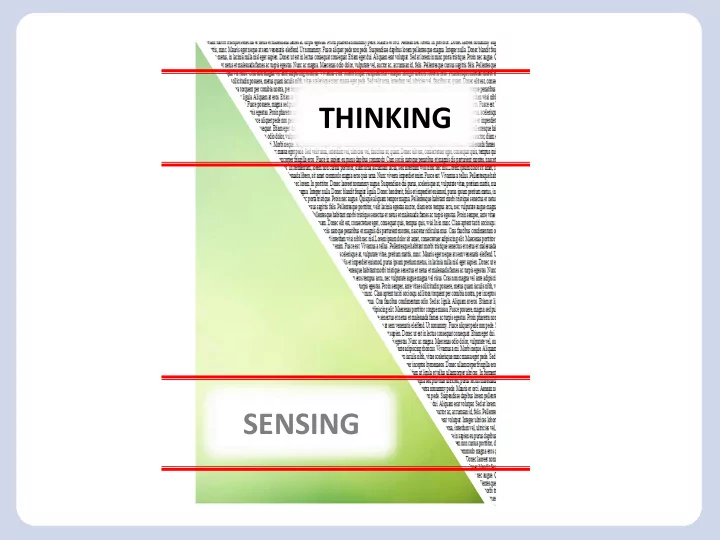

THINKING SENSING
‘Driven - Doing’ & ‘Mindful - Being’ Modes Conceptual v Embodied Past & Future v Present Autopilot / Habitual v Intentional / Creative Reacting v Responding Thoughts as facts v Thoughts as mental events
Distinct neural modes…
Thinking / Doing mode This is useful… • To formulate meanings • To get things done But when it’s over - used… • Preoccupation with commentary • Planning (even when not wanted)
In anxiety disorders & depression… The key maintaining factor = PERSISTENT OVER-USE OF THINKING MODE Rumination & attempts to stop it
What is Mindfulness? “present moment awareness / recollection”
What is Mindfulness? Mindfulness involves paying attention … on purpose in the present moment and non-judgementally …to things as they are Dr Jon Kabat-Zinn
Mindfulness training increases ‘ viscero- somatic’ processing and uncouples ‘narrative - based’ processing ( Farb et al, 2007) Farb, N., Segal, Z.V., Mayberg, H., Bean, J., McKeon, D., Fatima, Z., & Anderson, A. (2007). Attending to the present: Mindfulness meditation reveals distinct neural modes of self-reference. Soc Cog Aff Neurosci., 2 , 313-322.
Mindfulness-Based Stress Reduction Dr Jon Kabat-Zinn Stress Reduction Clinic University of Massachusetts
Mindfulness for Depression Oxford, Bangor & Exeter Universities
Teasdale, Williams & Segal et al.,2000 (for patients with 3 or more previous episodes - 60 weeks) 1.00 MBCT: 37% 0.5 TAU: 66% 10 20 30 40 50 60
MBCT available on the NHS
Age of Onset of Major Depression (N=4041; Zisook, 2007, American Journal of Psychiatry)
The Oxygen Mask Principle
Mental Health Foundation www.bemindful.co.uk
Non-Clinical Mindfulness Courses for Oxford University Students
Professor Mark Williams Oxford University Mindfulness Centre
Non-Clinical Mindfulness Courses for Oxford University Students • ‘Frantic World’ book as course textbook • 8 x 90 min sessions • Introductory presentation [20 min] in first session • Group size: 30 • Students pay £60 for course • Courses hosted by Colleges • Pitched to general population • Follow-on with Oxford Student Mindfulness Society
‘Modes of Mind’ - an inclusive paradigm Thinking Sensing
The ‘Frantic World’ Mindfulness Courses 1. ‘Waking up to the Autopilot’ 2. ‘Keeping the Body in Mind’ 3. ‘The Mouse in the Maze’ – mindfulness in daily life 4. ‘Moving Beyond the Rumour Mill’ – relating differently to thoughts 5. ‘Turning towards Difficulties’ 6. ‘Trapped in the Past..?’ – from self-criticism to self- compassion 7. ‘When did you stop dancing?’ – activity scheduling 8. ‘Your Wild and Precious Life’
Eight week MBCT course Induction 2 hrs Week 1 2 hrs Week 2 2 hrs Week 3 2 hrs Home Week 4 2 hrs practice Week 5 2 hrs About 1 hr a day 6 days a week Week 6 2 hrs Practice Day 6 hrs Week 7 2 hrs Week 8 2 hrs 24 hrs 40 hrs > 60 hrs
Eight week FW course No Induction? Week 1 90 min Week 2 90 min Home Week 3 90 min practice Week 4 90 min About 20 min a Week 5 90 min day Week 6 90 min 6 days a week No Practice Day? Week 7 90 min Week 8 90 min 12 hrs 16 hrs > 28 hrs
What are the crux points in the lives of the students that you’re teaching?
Eating Pain Anger Sleeping Stress Exams Relationships Depression
Performance
“the flourishing of young minds”
Recommend
More recommend